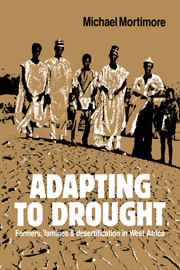Book contents
- Frontmatter
- Contents
- List of figures
- List of plates
- List of tables
- Preface
- Acknowledgements
- A note on conventions and list of abbreviations
- 1 Introduction
- 2 From feast to famine?
- 3 Drought in the 1970s
- 4 Thirteen years in the life of a village
- 5 Wider horizons
- 6 Two dry decades
- 7 Shifting sands
- 8 Interpretation
- 9 Policy directions
- Notes
- Bibliography
- Index
- Frontmatter
- Contents
- List of figures
- List of plates
- List of tables
- Preface
- Acknowledgements
- A note on conventions and list of abbreviations
- 1 Introduction
- 2 From feast to famine?
- 3 Drought in the 1970s
- 4 Thirteen years in the life of a village
- 5 Wider horizons
- 6 Two dry decades
- 7 Shifting sands
- 8 Interpretation
- 9 Policy directions
- Notes
- Bibliography
- Index
Summary
Go down and buy grain for us there, that we may live
Genesis 42:2Spatial mobility is an entrenched characteristic of West African populations, but its importance in the economic strategies of individuals and households is rarely given adequate recognition in sectoral studies. Not all mobility has economic objectives, of course. Prominent exceptions are: the periodic circulation of koranic scholars (H almajirai) and of schoolchildren; the pilgrimage to Mecca (haj; Birks, 1978); and migration for marriage (e.g. Mortimore and Wilson, 1965: 35–7). The existence of such objectives implies that a strictly economic interpretation of mobility is inadequate. However, an inescapable factor in the system is drought, whether viewed on a seasonal or an annual basis. A sudden intensification of drought, as observed from behaviour in the past, may be expected to produce corresponding changes in the intensity and characteristics of mobility.
MOBILITY IN THE CITY: KANO'S STRANGERS
The population of the old walled city (Birni) of Kano was swelled each dry season by numbers of men and boys who left their villages for a few months in order to pursue koranic study (H karatu) or practise secondary occupations (H sana'a). Such visitors had a claim, under an Islamic convention of hospitality, to sleep in an entrance hall (H zaure) of a city householder (H maigida). Shortterm mobility (cin rani) for karatu and sana'a is deeply embedded in Hausa tradition, and the destinations chosen are rural as well as urban.
- Type
- Chapter
- Information
- Adapting to DroughtFarmers, Famines and Desertification in West Africa, pp. 117 - 135Publisher: Cambridge University PressPrint publication year: 1989



